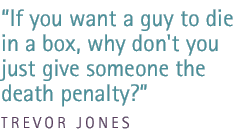
Serving life without parole for a con gone bad, Trevor Jones is an example of the exacting logic of Colorado's felony murder statute.
Around 8:30 p.m. on Nov. 21, 1996, Trevor Jones, 17, and a friend met Matt Foley, 16, and another teen in a Denver parking lot. Matt was looking to purchase a handgun for his cousin; Trevor and his companion had a gun to sell, for $100. But Trevor had no intention of actually parting with the weapon.
"The scheme was that ... he would give me money, and then I would, through deception, get the gun back, telling him I would just show him something about the gun. Then I would have both the money and the gun," Trevor told FRONTLINE.
After executing the plan, Trevor and his companion began to depart, but while Trevor was telling Matt not to tell anyone about the con, the gun discharged. The bullet hit Matt in the head; he died that night. Trevor turned himself in to the police the next day.

Gail Palone, Matt Foley's mother, told FRONTLINE she has never believed that her son's death was an accident: "An accident is an accident, but it wasn't. It was cold-blooded murder, and I don't feel different. I never will feel different. I never will."
The jury at Trevor's trial did not agree; they convicted him of reckless manslaughter instead of first-degree murder. But they also convicted him of robbery, which resulted in a conviction on the charge of felony murder and a mandatory sentence of life without parole.
Felony murder is a legal doctrine that holds that an individual who commits a violent felony -- in Trevor's case, robbery -- is held responsible for a death that occurs as a result of the felony, regardless of whether the individual intended or directly caused the death.
Trevor's legal team appealed the convictions, arguing their client was being punished for Matt Foley's death twice -- once with the manslaughter conviction and again with felony murder. They argued the court should throw out the felony murder conviction because manslaughter more accurately represented the will of the jury.
The Colorado Court of Appeals agreed that Trevor could not be convicted on both charges, but they vacated the manslaughter conviction in favor of felony murder -- and life without parole. "In this situation, Colorado law provides that the court give effect to the most serious offense as reflected by the longest sentence," explained the U.S. Tenth Circuit Court of Appeals in a November 2006 order denying a federal appeal of the case.
Despite the court's ruling, the felony murder doctrine and its mandatory sentence riled some of the jurors from Trevor's trial, one of whom told the Denver Post in 2006 that he wished he had found Trevor guilty of theft rather than robbery because theft is not a crime that would have triggered a felony murder conviction.
The crucial difference between robbery and theft is whether Trevor threatened Matt as he was leaving with the gun and the money. Trevor told FRONTLINE he believes it was the testimony of his companion that night, who was also charged in the case, that convinced the jury he had threatened Matt. In exchange for that testimony, Trevor's co-defendant pleaded guilty to conspiracy to commit aggravated robbery. But because he was tried in juvenile court -- and because prosecutors agreed not to charge him with felony murder -- he avoided a long sentence.
Asked whether he did, in fact, make a threat to Matt before the gun went off, Trevor said, "It wasn't much of a threat. I mean, maybe by definition, I'm telling him, you know, 'You better not say anything about this.' But for me it was more of, kind of just running my mouth."
"It was stupid," he went on. "Stupid words from a 17-year-old who had a propensity to run his mouth."

Trevor Jones during his 2007 interview with FRONTLINE.
Trevor Jones says that he has turned his life around in prison. He credits a staffer at the juvenile hall where he was awaiting trial with introducing him to Christianity. He has taken correspondence courses in religion, paid for by his family. "In the last year, I actually have started taking seminary courses," he told FRONTLINE.
Gail Palone is skeptical of the jailhouse conversion, and she refuses to meet with Trevor. "I wouldn't waste my time seeing him," she told FRONTLINE. "There would be no satisfaction in conversing with Trevor, ever."
Trevor told FRONTLINE he doesn't understand why Matt's family doesn't believe that the shooting was an accident, especially since Matt's friend who accompanied him that night testified to that effect. "Maybe it was part of their way of dealing with it all. Maybe they couldn't deal with the senselessness of an accidental death."
The crime has damaged both Trevor's and Matt Foley's families. Gail Palone told FRONTLINE that her grief took a physical toll on her. "I went down to 88 pounds afterwards," she said. She refuses to speak to the cousin for whom Matt was attempting to purchase the gun.
Trevor's parents divorced after he received his life sentence. Trevor's sister Jennifer was inspired by Trevor's case to study law. She hopes to pursue a career as a public defender.
The one thing both Trevor and Gail Palone agree on is that the death penalty might be a better punishment than life without parole -- but for very different reasons. "If the family would have gotten to sentence him for his crime, we wouldn't be sitting here right now. We wouldn't, because we believe in capital punishment," Palone told FRONTLINE.
"If you want a guy to die in a box, why don't you just give someone the death penalty?" Trevor asked. "As far as our society is concerned, you're put out in a box somewhere in the middle of nowhere and that's where they're going to keep you until you're done, until you're life is over. So you are very much thrown away."
RELATED LINK
- "Teen Crime, Adult Time"
Part of a 2006 Denver Post series on juveniles serving life without parole, this article uses the Trevor Jones case to explore the complexities of Colorado's felony murder statute.
home . introduction . watch online . five stories . state-by-state map . interviews . timeline . join the discussion
conversation with ofra bikel . readings & links . teacher's guide . site map . dvd & transcript . press reaction
credits . privacy policy . journalistic guidelines . FRONTLINE series home . wgbh . pbs
posted may. 8, 2007
FRONTLINE is a registered trademark of wgbh educational foundation.
background photograph © scot frei/corbis
web site copyright WGBH educational foundation